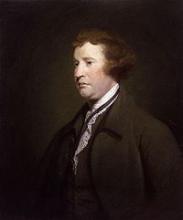Edmund Burke was an influential Irish writer and politician in 18th century England. Born in 1729, h moved from his native Ireland to Britain where he served as a Whig party member in the House of Commons for many years. He was a hugely influential thinker within his party and during his time period, shaping the Whig party politics for many years. In fact, he split the party into two—the conservative section that he lead called the “Old Whigs” in opposition to a more liberal group he called the “New Whigs.”
After his death in 1797, Burke’s politics were lauded by conservatives and liberals in the 19th century and have generally been dubbed the cornerstone of the modern conservatism. Burke supported the American Revolution and opposed the French Revolution. He went on to write a pamphlet called Reflections on the Revolution in France and published it in 1791. The pamphlet started a small pamphlet war of its own with Thomas Paine writing The Rights of Man and Mary Wollstonecraft writing A Vindication of the Rights of Men in direct response to Burke.
As mentioned, Burke spoke quite often against the violence of the French Revolution. In his essay “On the Death of Marie Antoinette,” Burke criticizes the inhumane and violent actions that took place during the French Revolution. During this period, people with royal French ancestry, as well as their supporters, were often imprisoned or executed. In 1793, Antoinette, after being thrown from the French thrown, was beheaded following the French revolution. In the essay, Burke mourns the queen’s death as well as the end of beautiful time that her death represented.
In this essay, Edmund Burke is a proponent of following old traditions in political systems. In short, Burke loved monarchies and saw no reason that they should reach their demise. He believes in the inheritance of ruling positions based on birth into royal families and says this system of inheritance follows the ways “of nature.” He also believes these ruling families were the example the lower classes needed and should look to in modeling their own behavior. For example, he looked at France’s queen Marie Antoinette less as a person, and more like a “sublime object” her people could emulate.
This quotation fits into Burke’s idea of inherited political institutions as natural and to his idea that the ruling class is a model for the lower people to follow. The quotation “nor can we know distinctly to what port we steer” fits into his argument about the inheritance of political institutions. This quotation seems to say once institutions were no longer inherited and then replaced by new institutions; people could never know in what direction they were headed like they would in a stably inherited institution. When he speaks of having “no compass to govern us,” Burke seems to be speaking both in a political sense, and based on his earlier argument, a behavioral sense. People not only don’t have a stable political family to rule them, but also have no ruling family on whom to base their societal behavior.
